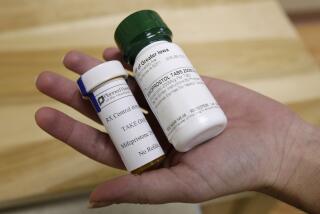âMorning Afterâ Use of Pill Found Safe by FDA Panel
WASHINGTON â High doses of standard birth control pills are safe and effective in preventing pregnancy when used as âmorning afterâ pills after unprotected sex, a federal advisory committee concluded Friday.
The Food and Drug Administrationâs reproductive health drugs advisory committee said--unanimously--that evidence is clear that the regimen is effective in preventing pregnancy and appears to pose little health risk.
For the record:
12:00 a.m. July 3, 1996 For the Record
Los Angeles Times Wednesday July 3, 1996 Home Edition Part A Page 3 Metro Desk 2 inches; 47 words Type of Material: Correction
Birth control pills--In a story in Saturdayâs Times on the use of birth control pills as âmorning afterâ pills to end pregnancy, Rebecca Lindstadt of the American Life League was quoted incorrectly. She should have been quoted as saying that using birth control pills in this way âis killing an unborn child whose life has already begun.â
Conclusions by FDA advisory committees generally have significant influence on the agencyâs policymaking process.
The committeeâs conclusion raises the controversial possibility that manufacturers could be allowed to promote and market the pills for âmorning afterâ use and that physicians would be encouraged to prescribe them for such use.
The term âmorning afterâ is actually a misnomer, since the pills can be taken up to 72 hours after unprotected intercourse.
Companies could ask the FDA to allow them to add this information to existing product labels or to approve the marketing of separately packaged pills expressly for use as a âmorning afterâ form of contraception.
The process involves taking ordinary oral contraceptives containing both estrogen and progestin. Six brands have been shown to have the right combination of hormones to prevent a fertilized egg from implanting in the uterus.
The first dose, usually two to four pills, is taken within 72 hours of intercourse. A second dose, usually the same number of pills as the first, is taken 12 hours after the first dose.
Studies have shown it to be about 75% effective in preventing pregnancy.
Side effects include nausea and vomiting.
Most abortion foes do not oppose contraception but disapprove of anything that interrupts a pregnancy at any point after fertilization.
Thus, this procedure âis killing an unborn child before its life is even begun,â said Rebecca Lindstadt of the American Life League.
But many reproductive health professionals believe just the opposite: that using the pills after unprotected intercourse can prevent both unwanted pregnancies and abortion.
Dr. Stanley Zinberg, director of practice activities for the American College of Obstetricians and Gynecologists, predicted that the method could prevent as many as 1.7 million unwanted pregnancies and 800,000 abortions a year.
Use of the pills as emergency contraception could âprevent the majority of pregnancies that result from a single act of unprotected intercourse,â he said.
The reproductive health community has known for many years that the regimen works and is safe but the procedure has not been widely used in this country.
None of the birth control pill manufacturers has asked the FDA for permission to market the pills for this purpose, likely fearing political and social ramifications.
The FDA could ask or even require the companies to apply for such permission, although it is not clear whether it will do so. In May, the agency denied a petition from the public interest Center for Reproductive Law and Policy to require companies to include this information on their labels. At the same time, it promised that an advisory committee would take up the issue.
âWe donât want to turn up the heatâ on manufacturers âbut we take seriously our obligation to not just protect the public health but promote it,â said FDA Deputy Commissioner Mary Pendergast.
âWe believe that all women seeking to prevent pregnancy should receive information about this method and whether or not it is safe and effective for them,â Lisa Cox of the National Womenâs Health Network told the panel.
The routine has been used successfully in the United Kingdom since 1984, according to Dr. Elizabeth Barden, who practices in Edinburgh, Scotland.
About 3.5 million doses have been administered in that time, she said, and only six women suffered serious side effects, including one death.
But it was not confirmed that the pills were responsible for the reactions or the death, she said.
But David OâSteen, executive director of the National Right to Life Committee, said Friday: âWe will oppose anything that destroys a life after fertilization.â
Zinberg of the American College of Obstetricians and Gynecologists, said that, despite widespread physiciansâ awareness of the procedure, âit remains underutilized in this country.â
A survey of health professionals conducted last year by the Kaiser Family Foundation found that most gynecologists/obstetricians âhave made only a handful of their female patients aware of [this regimen] and do so, generally, in response to an emergency situation, rather than during routine contraceptive counseling.â
This was attributable, in part, the survey found, to the view that the pills were meant to be used in this fashion only âas a backup method for contraceptive emergencies,â and that many women did not know they could seek such help from a physician after the fact.
Zinberg said that ACOG was preparing âclinical practice guidelinesâ on use of the pills as emergency birth control, which would greatly influence doctorsâ usage of the regimen.






